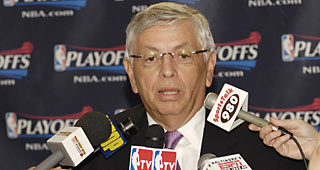Did league executives anticipate the player revolt they witnessed on Monday?
Chris Sheridan writes that David Stern and Adam Silver misjudged how much resistance the league's tough negotiating stance was fomenting among the ranks of the other side.
"They made the monumental miscalculation that there would not be a mutiny from within the player/agent ranks if they pushed it too far," Sheridan wrote, "yet they pushed it too far late last week during the last round of negotiations, refusing to make enough concessions on system changes to win Billy Hunter’s endorsement."
That mutiny became the new reality that the NBA finds itself in when Hunter announced on Monday that the union was ending bargaining and disclaiming interest in representing the players.
Sheridan believes that Stern never actually believed that it would come to this, a view that seems supported by the uncharacteristically hushed tones that marked Stern's comments in an interview on ESPN soon after the union made its disclaimer known.
Sheridan offers other insights, including that Hunter should have been "very, very specific" about the conditions under which he would agree to drop the players' share to 50 percent of basketball-related income. When Hunter agreed to drop his offer to 50 percent and then proceeded to discuss the remaining system issues in a more open-ended way -- the theory goes -- he put the negotiations on a dangerous course in which the NBA was going to continue asking for more concessions, concessions that (as it turns out) would be impossible for the players to accept.
Sheridan believes Stern still has an opportunity to call up Hunter or Jeffrey Kessler and make an improved offer before the union officially files its disclaimer. But between that option and heaping more blame on the union's leadership, Sheridan predicts Stern will continue to choose the latter.


